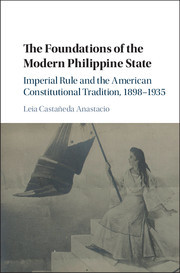The Foundations of the Modern Philippine State Imperial Rule and the American Constitutional Tradition in the Philippine Islands, 1898–1935 Cambridge Historical Studies in American Law and Society Series
Langue : Anglais
Auteur : Castañeda Anastacio Leia

This book examines how the colonial Philippine constitution weakened the safeguards that shielded liberty from power and unleashed a constitutional despotism.
The US occupation of the Philippine Islands in 1898 began a foundational period of the modern Philippine state. With the adoption of the 1935 Philippine Constitution, the legal conventions for ultimate independence were in place. In this time, American officials and their Filipino elite collaborators established a representative, progressive, yet limited colonial government that would modernize the Philippine Islands through colonial democracy and developmental capitalism. Examining constitutional discourse in American and Philippine government records, academic literature, newspaper and personal accounts, The Foundations of the Modern Philippine State concludes that the promise of America's liberal empire was negated by the imperative of insulating American authority from Filipino political demands. Premised on Filipino incapacity, the colonial constitution weakened the safeguards that shielded liberty from power and unleashed liberalism's latent tyrannical potential in the name of civilization. This forged a constitutional despotism that haunts the Islands to this day.
Introduction; 1. Republican means, imperial ends: American empire and the rule of law; 2. American theory, Spanish structure, and Ilustrado capacity: inventing the Filipino people, constructing the American colonial state; 3. Foreign in a domestic sense: organic sovereignty, unincorporated territories, and the insular doctrine; 4. Sovereign but not popular: Colonial Leviathan, inherent power, and plenary authority; 5. Progressive interventions, parchment barriers: civilizing mission, colonial development, and constitutional limitations; 6. Popular but not sovereign: colonial democracy and the rise of the Philippine Assembly; 7. American vessels, Filipino spirit: Filipinizing the government of the Philippine Islands; 8. Filipinizing the public: the business of government and the government in business; 9. Progressivism, populism, and the public interest: restoring Taft era and the Cabinet Crisis of 1923; 10. Colonial conflict, constitutional categories: constitutional Imperialism and the Board of Control Cases; 11. From 'is' to 'ought': constitutionalizing colonial legacies; Conclusion.
Leia Castañeda Anastacio is an independent scholar affiliate of Harvard Law School's East Asian Legal Studies program. Placing first in the 1993 Philippine Bar Examinations, she was awarded Harvard Law School's Yong Kim '95 Memorial Prize in 2008 and the American Society of Legal History's William Nelson Cromwell Foundation Dissertation Prize in 2010.
Date de parution : 11-2019
Ouvrage de 339 p.
15.2x23 cm
Date de parution : 08-2016
Ouvrage de 334 p.
15.7x24.2 cm
Disponible chez l'éditeur (délai d'approvisionnement : 14 jours).
Prix indicatif 56,07 €
Ajouter au panierThème de The Foundations of the Modern Philippine State :
© 2024 LAVOISIER S.A.S.


